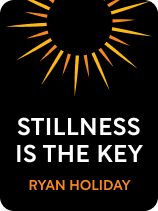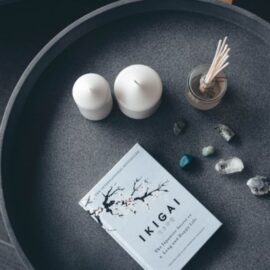

This article is an excerpt from the Shortform book guide to "Stillness Is the Key" by Ryan Holiday. Shortform has the world's best summaries and analyses of books you should be reading.
Like this article? Sign up for a free trial here.
What is meant by “soul work”? What are some things you can do to improve your soul’s health?
According to Ryan Holiday, doing soul work is the key to happiness and contentment. To begin to heal your soul, you must confront and heal your spiritual wounds, cultivate virtue, and connect to something beyond yourself.
Here’s how to do soul work, according to Ryan Holiday.
Release Toxic Emotions
To do soul work, you should first address the negativity you hold in your soul, such as childhood trauma, anger, desire, and dissatisfaction.
Holiday says that everyone has residual pain from childhood experiences and that you should learn to recognize and heal that pain through self-reflection, self-love, and therapy. We often react to life’s situations from this wounded place, so understanding the roots of our childhood pain will help us avoid that. One way to think about breaking generational patterns of trauma, Holiday suggests, is to think about what you didn’t get as a child, and commit to giving more of that.
Another problem we have in the realm of the soul is toxic emotions. Holiday says the following emotions particularly trip us up:
- Desire: Lust and desire enslave us. We’re never really free if we can’t control our urges. Envy is the most common type of desire that entraps people. When you face temptation, take time to think about the consequences of giving in. Noticing your temptations and resisting them develops spiritual strength and will help you avoid regret.
- Dissatisfaction: Know when you have enough and be content with it so you’re not always chasing “more.” You can’t have peace and stillness while craving more wealth, material possessions, power, and other worldly pursuits.
- Anger: Anger is a destructive force. People who are angry can’t be happy and at peace. We don’t need to just avoid anger—we need to totally defeat it within ourselves. Calming anger requires responding differently to situations. Slow down, take time to process, and react with stillness and clarity instead.
Become Virtuous
Without a strong moral code to live by, Holiday says you’ll be confused and never have peace. For this reason, stillness requires cultivating virtue in your life, as a means of enriching your soul and guiding your behavior.
A virtuous life is worth living for its own sake, Holidays says, and you can cultivate virtue in yourself by intentionally defining your moral code. To define your moral principles, you should take time to really contemplate what’s important to you. To that end, ask yourself the following:
- How do I want to live?
- What do I stand for?
- What makes life worth living?
- What values would I rather die than not embody?
When you’ve answered these questions and know clearly what your moral principles are, you can call on them in decision-making and use them to guide you through confusion or difficulty.
Holiday says that relationships are one of the most soul-enriching things available to us. He says everything is meaningless and empty if we don’t have love and others to share it with. In fact, stillness is actually more for other people than for ourselves. In addition to providing nourishment for your soul, good relationships will require you to practice your virtuous behaviors, and therefore continue to grow.
Connect With Something Greater
An important piece of soul development, according to Holiday, is connecting with something greater than yourself. You can think of this as God, a universal energy, or any kind of higher power. He says without a belief that there is something greater beyond us, life is meaningless.
Holiday says that connecting to a higher power contributes to stillness in three ways:
- It allows you to relax, knowing that things are being taken care of on a grander scale. Holiday says putting ourselves at the center of the universe is egotistical, and believing only in the material world leads to nihilism, fragility, and depression. When you remember that there is a higher power and a higher purpose or guiding force in life, you can relax and feel at peace. Putting yourself in perspective of the vastness of the universe can quiet your mind and allow for stillness.
- It gives you a sense of oneness with everything. When you recognize the interconnectedness of all of humanity and all of life—past, present and future—you feel that you’re one with your ancestors and with all of the living world. This kind of connectedness encourages humility and empathy, which lead to forgiveness and understanding.
- It empowers you to accept death without fear. Don’t try to escape death, Holiday says. Knowing how to live well also teaches you how to die well. We spend so much of our life in fear or denial of death instead of living life to the fullest. Remember, your life will end in permanent stillness, so practice it in preparation.

———End of Preview———
Like what you just read? Read the rest of the world's best book summary and analysis of Ryan Holiday's "Stillness Is the Key" at Shortform.
Here's what you'll find in our full Stillness Is the Key summary:
- Why stillness is not just the absence of motion
- How to cultivate stillness in your mind, body, and soul
- Why you should start ignoring the news






